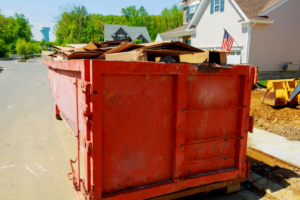
Dumpster rentals, though often overlooked, are the unsung heroes behind countless projects. They slip quietly into alleys, yards, and driveways, offering a no-fuss escape for debris, trash, and forgotten clutter. But not all dumpsters are created equal, and when it comes to temporary rentals, the difference is in the details. Whether you’re gutting a home, revamping a storefront, or simply purging years of accumulated mess, the right dumpster can streamline your cleanup in ways you never imagined.
Temporary dumpster rentals aren’t just about convenience; they’re about strategy. Choosing the wrong size, failing to account for local ordinances, or simply misjudging the timeline can lead to chaos. Dive deep into what makes these rentals tick, and how proper planning can turn your next cleanout into a seamless operation.
The Timeline Behind a Successful Dumpster Rental
Understanding the timeline of your dumpster rental is crucial for a smooth project. A dumpster rental isn’t a static service—you need to plan the timing to ensure your project proceeds without delays or interruptions. Typically, the rental period ranges from a few days to two weeks. A short rental may not give you enough time to finish your project, forcing you to rush and leading to incomplete work or piles of junk still sitting around. Meanwhile, overextending the rental period can cause unnecessary charges.
When setting your rental dates, be sure to plan for potential setbacks like weather delays or unexpected snags. By aligning your dumpster rental with your project’s start and end dates, you’ll streamline the process. Communicate with your rental provider ahead of time to lock in the right pickup schedule, and add a buffer to account for any project delays, so you aren’t scrambling for an extension when you’re nearing completion.

What You Can and Cannot Toss in a Temporary Dumpster
Not everything qualifies for a dumpster. While yard waste, construction debris, and old furniture are typically acceptable, some items are off-limits due to environmental regulations and safety concerns. Hazardous materials like paint, tires, chemicals, or electronics must be disposed of separately, usually at specialized facilities. Throwing prohibited items into a dumpster can lead to costly fines, delayed pickups, and even legal issues. Some rental companies might have specific rules, so it’s essential to familiarize yourself with what’s acceptable before your rental.
This isn’t just a matter of avoiding fines; it’s about ensuring that your waste is disposed of properly. For example, electronics require special handling due to the presence of harmful substances like lead and mercury. To ensure responsible disposal, communicate clearly with your dumpster provider about what you plan to throw away. If in doubt, ask your provider, and ensure you follow all local regulations to avoid any headaches.
Navigating Permits and Local Regulations for Dumpster Use
Renting a dumpster isn’t as simple as placing it wherever you like on your property. In some cases, especially in urban environments, you may need a permit to place your dumpster on public property like streets or sidewalks. Many Chicago suburbs have strict rules in place for dumpsters, particularly when they’re positioned in high-traffic areas or in front of public spaces.
Failing to secure a permit can lead to fines, immediate removal of the dumpster, or unnecessary delays. The process for obtaining a permit can vary, and some rental companies assist with securing them, but it’s ultimately your responsibility to check with the local authorities. You’ll need to contact the city’s public works or building department to confirm regulations and obtain necessary paperwork.
How Dumpster Placement Impacts Accessibility and Safety
- Flat, Solid Surface: Choose a flat, solid surface such as a driveway, parking pad, or gravel area to ensure the dumpster stays securely in place. A stable surface helps prevent the dumpster from shifting, rolling, or causing damage to your property. Uneven or soft ground, like grass or dirt, can lead to instability and create a safety hazard for both workers and the delivery truck.
- Clear of Obstacles: It’s important to place the dumpster away from trees, overhead wires, or parked vehicles. Obstacles can block access for the delivery truck or make it difficult to load debris into the dumpster. Additionally, certain obstructions may pose a risk of damage during the dumpster’s delivery or pickup.
- Accessibility for Delivery and Pickup: Make sure the delivery truck has a clear path to drop off and pick up the dumpster. You’ll want to avoid placing the dumpster in a tight or narrow area, which may cause the truck to struggle to maneuver. A well-planned location ensures that the process is smooth, efficient, and hassle-free, avoiding delays or additional costs.
- Avoid Blocking Driveways or Walkways: When choosing a location, ensure that you’re not blocking any driveways or walkways. Blocking these areas can not only inconvenience you but also your neighbors, potentially causing frustrations or complaints. Keeping pathways clear ensures that vehicles can pass through without obstruction, allowing everyone to move freely around the property.
- Consider Neighbors: Be considerate of your neighbors when placing the dumpster, especially if it’s near a shared property line. Placing the dumpster too close to their property or blocking their access can cause tension. Try to choose a location that minimizes any disruption to their daily routines, helping maintain good relations while keeping your project on track.
The Cost Factors in Renting a Temporary Dumpster
Renting a dumpster involves more than just paying for a container. The total cost is influenced by several factors, such as the size of the dumpster, rental duration, and the weight of the debris. Larger dumpsters cost more, but if you rent a unit that’s too small, you may need to call for additional pickups, which will drive up the price. Rental periods also play a big role in determining cost. Most companies offer rental periods from a few days to a week, but extending the rental can lead to extra charges.
Additionally, certain materials may incur higher fees due to disposal costs. For example, construction debris or heavy materials might cost more to dispose of than lighter waste. To avoid sticker shock, ensure you fully understand the pricing structure upfront. A reputable rental service will provide clear guidelines on fees for overage weight, extended rental periods, or special disposal requirements, allowing you to avoid any surprise costs down the line.
Sustainability and Responsible Waste Disposal Practices
In an age of environmental awareness, the way your junk is disposed of matters. More dumpster rental companies are embracing sustainability by offering services that prioritize recycling and eco-friendly waste management. Instead of dumping everything in a landfill, many companies sort materials to ensure that recyclable items, such as metals, plastics, and paper, are diverted to the proper facilities. Some services may even go a step further, ensuring that hazardous waste is disposed of safely and in compliance with environmental standards.
Opting for a company that values sustainability helps reduce your project’s ecological impact. To make an informed decision, inquire with your rental provider about their waste disposal practices. What happens to the items once they leave your property? Does the company take steps to sort and recycle? By choosing an environmentally conscious provider, you’ll know that you’re making a positive contribution to the planet—one dumpster load at a time.
When to Rent a Dumpster for Residential versus Commercial Use
The needs of residential and commercial dumpster rentals are quite different, and understanding these differences ensures you rent the right type of container. Residential projects typically involve home renovations, cleanouts, or large yard waste removal. These types of projects generate debris that, while significant, tends to be lighter and less bulky than what’s seen in commercial or industrial settings. For these projects, homeowners might need smaller containers and shorter rental periods, typically a few days to a week.
In contrast, commercial projects involve larger-scale operations such as office cleanouts, construction sites, or warehouse clearing. These projects require bigger containers, longer rental durations, and sometimes more frequent pickups to manage the higher volume and heavier weight of debris. Commercial dumpsters are often larger and specifically built to handle industrial waste, like concrete, drywall, and heavy machinery parts. Understanding the scale of your project will help you select the right dumpster, ensuring cost-effectiveness and efficient waste management.
How to Prepare for Your Dumpster Delivery and Pickup
Preparation is the key to a smooth dumpster rental experience. Before your dumpster arrives, make sure the designated drop-off area is clear of obstacles such as vehicles, debris, or low-hanging branches. The delivery truck needs enough space to maneuver and place the container safely. If the dumpster is going on a public street or sidewalk, you’ll need to ensure proper permits and check that there are no obstructions that might block the way.
Inform your neighbors if necessary, especially if the placement might cause inconvenience. Once the dumpster is full and you’re ready for pickup, double-check that the contents are within the weight limits and that no prohibited items are inside. The truck driver needs to be able to easily access the dumpster for removal, so avoid overloading it or placing items that could complicate the haul.
Conclusion
When undertaking a major home renovation, large cleanout, or simply tackling debris from a recent project, a temporary dumpster rental can be your best friend. These rentals provide the convenience of having a designated space for waste, allowing you to keep your work area organized and clutter-free. The key to a successful rental experience lies in choosing the right dumpster size for your project and placing it in an optimal location for easy access.
It’s equally important to ensure that your rental complies with local regulations, preventing fines and delays. Additionally, opting for an eco-friendly disposal service ensures that your waste is handled responsibly, contributing to environmental preservation. For a hassle-free junk removal experience in the Chicago area, look no further than 606 Junk Removal and Dumpster Rental. Contact them at 773-412-4902 or via email at info@606junk.com for a seamless service tailored to your needs.
